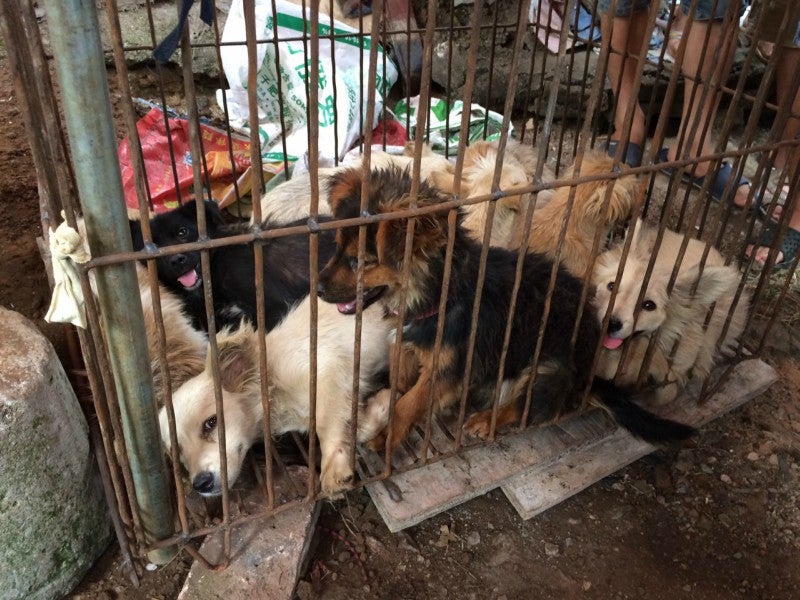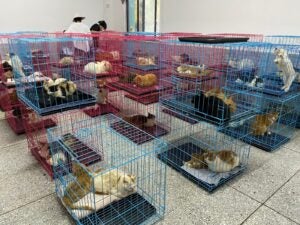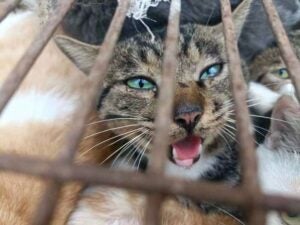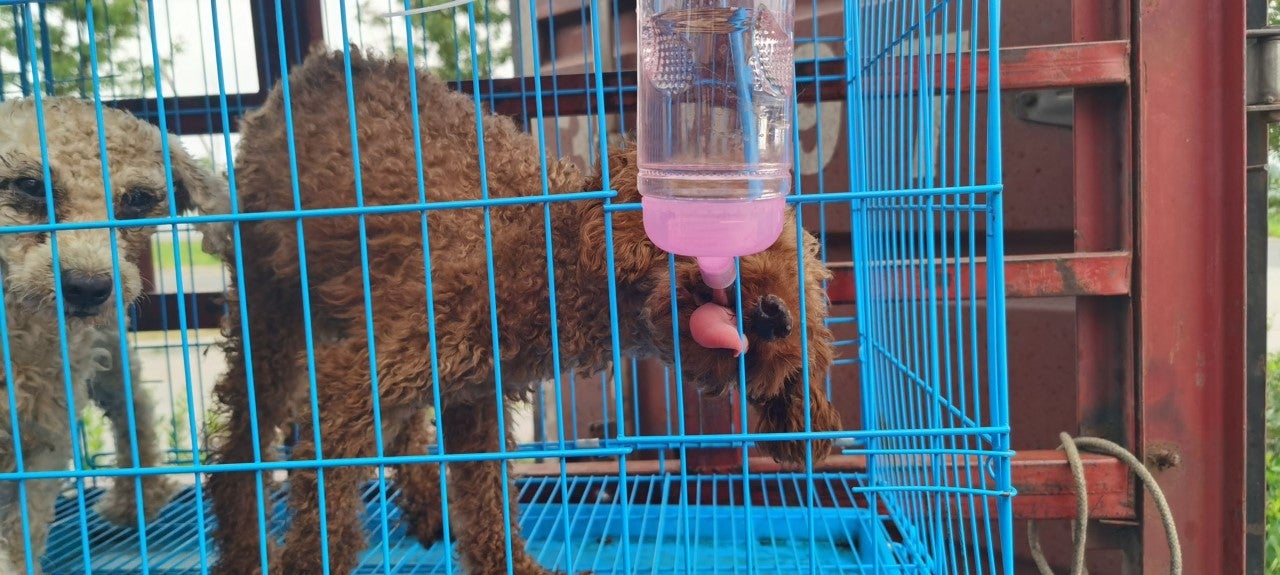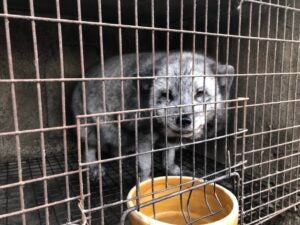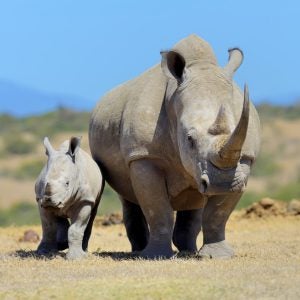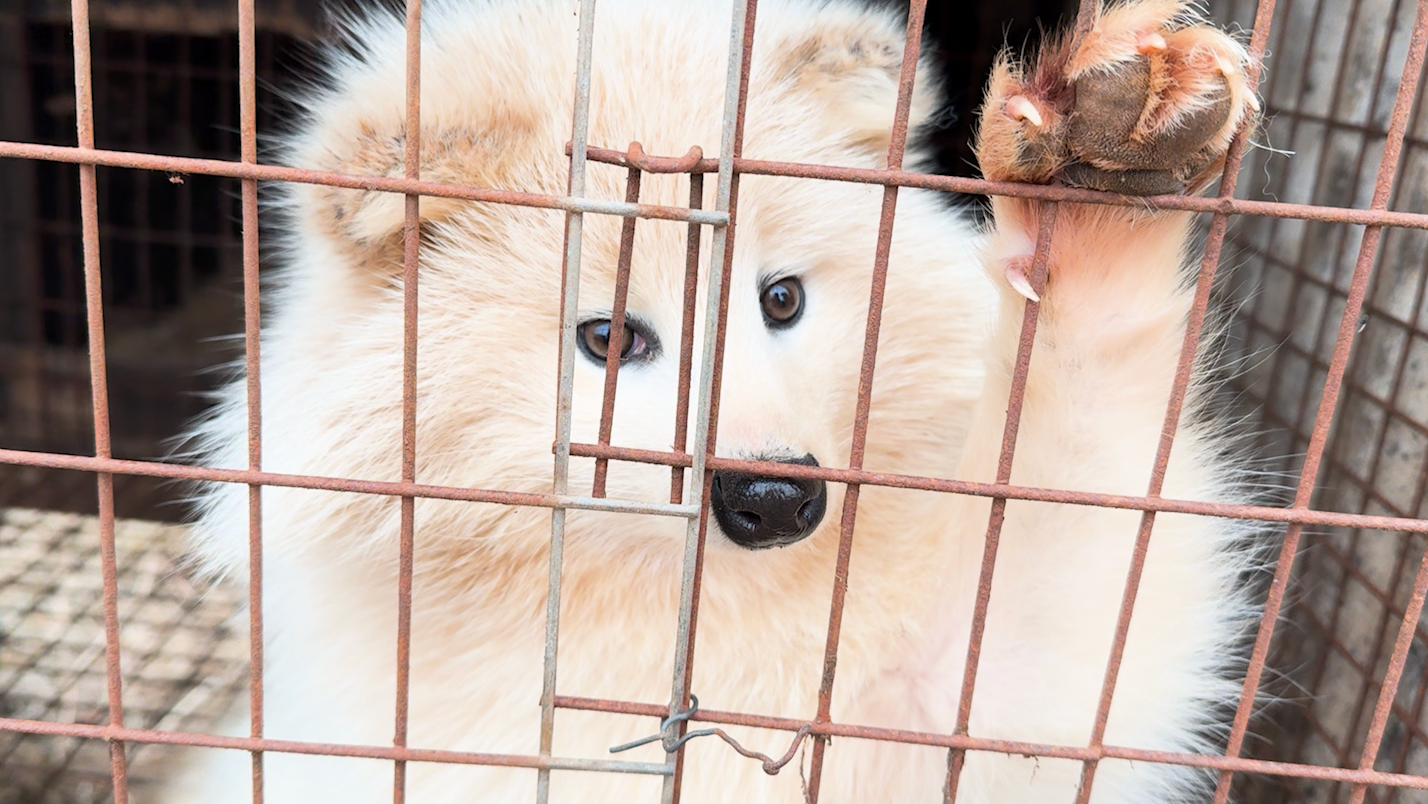
BEIJING—Alarming footage from fur farms in north China shows foxes, raccoon dogs and mink exhibiting repetitive, stereotypical behaviour associated with mental decline and animals kept in intensive conditions including in close proximity to poultry, despite the potential for zoonotic disease spread. The animal protection charity Humane Society International has released the footage and renewed its call for a global end to the fur trade.
Investigators visited five fur farms in December 2023 in the northern regions of Hebei and Liaoning where they also witnessed widespread use of antibiotics and the sale of raccoon dog carcasses for human consumption.
Official statistics from China’s Fur and Leather Industry Association reveal a 50% decline in the country’s fur production from 2022 to 2023 and a decline of almost 90% during the period 2014 to 2023, consistent with an overall decrease in global fur production . The investigators observed that a significant number of the rural small and medium sized fur farms previously active in the area had closed due to poor sales. Although still the largest fur-producing country in the world, China’s trade cannot escape the global consumer and designer shift away from fur on both animal welfare and environmental grounds.
Chinese investigator Xiao Chen said: “The fur farms we visited were typical of fur farms across China where animals are sadly held in cramped, barren cages, many pacing up and down repetitively due to psychological distress. These are naturally inquisitive, energetic animals but they are reduced to this sad existence in a wire cage with nowhere to go and nothing to do. I cannot imagine their frustration and boredom, all to produce something as trivial as fur fashion. I feel ashamed to be a human when I visit these fur farms and see the cruelty and indifference of which we are capable.”
Each of the fur farms visited kept between 2,000 – 4,000 fur bearing animals in small cages so packed together that in some cases the mink or raccoon dogs could touch animals in neighbouring cages through the wire walls, making disease transfer a possibility. Despite the many hundreds of COVID-19 and avian influenza cases confirmed on fur farms globally since 2020, the fur farmers confirmed to the investigators that they don’t routinely sterilize the farms because of cost considerations. Despite not being asked by any of the farmers to abide by disease prevention protocols before entering, the investigators took their own precautions.
The food preparation areas on several fur farms showed large quantities of frozen fish, chicken meat and liver, eggs and milk powder being ground up into paste to feed to animals. In addition to contributing to fur farming’s carbon footprint, feeding raw chicken meat to animals on fur farms has been identified by EU experts as a biosecurity risk.
Veterinarian Professor Alastair Macmillan, who viewed the footage, said: “As a veterinary microbiologist, I am deeply concerned by the apparent lack of biosecurity and potential for transmission of avian influenza due to chickens and ducks moving freely between cages of raccoon dogs. That demonstrates a ready route of transmission via direct contact or faecal contamination. Cases of avian influenza have already been documented on European fur farms and such close proximity between species significantly heightens the risk of avian-to-mammal transmission. The high stocking density of raccoon dogs could also facilitate virus adaptation to mammalian hosts and the selection of virus strains capable of transmitting between mammals. The sale of raccoon dog carcasses and cooked meat for human consumption also raises concerns about the potential for zoonotic disease transmission.”
The investigation found that the most common killing method on the fur farms is electric shock applied via the mouth and rectum, although some farm operators kill mink by smashing their heads against a metal pole or beating them over the head with a club. There are a number of markets in the region where animal carcasses from fur farms are sold for approximately 2-3 yuan/kg. One local restaurant visited by the investigators offered boiled, fried and marinaded raccoon dog meat for sale to local customers for around 20 yuan and confirmed that it cooked 42 raccoon dogs a day.
Dr Peter Li, HSI’s China policy expert, said: “Although this investigation took place in China, the animal suffering inherent in the fur trade can also be seen on fur farms across Europe and North America. Mentally disturbed animals, piles of animal filth, barren cages and worrying zoonotic disease risk is in stark contrast to the glamorous image the fur trade tries to portray. But that’s the grim reality behind this industry. China exports fur to countries such as the United Kingdom, the United States and across Europe, making those nations complicit in this cruelty. Responding to so many designers and consumers rejecting fur, fur farming in China has seen a dramatic reduction in recent years. But the end of this cruel, environmentally damaging and dangerous industry cannot come soon enough.”
Download photos and videos from the investigation.
ENDS
Media contact: Wendy Higgins, HSI’s director of international media: whiggins@hsi.org
Notes
In 2023, China produced 10 million fox, mink and raccoon dog fur pelts, a more than 50% decrease on the 22 million pelts produced in 2022 and an 88% decline from a decade ago. In 2014, China produced 87 million fur pelts—60 million mink pelts, 14 million raccoon dog pelts and 13 million fox pelts.
A study by carbon footprint experts at Foodsteps, commissioned by Humane Society International and reviewed by renowned sustainability expert Dr Isaac Emery, found that the environmental impacts of mink, fox and raccoon dog fur production significantly exceed those of other materials used in fashion, including cotton and even polyester and acrylic used to make faux fur. A significant component of fur’s carbon footprint is the vast quantity of animal products fed to carnivorous animals on fur farms.

